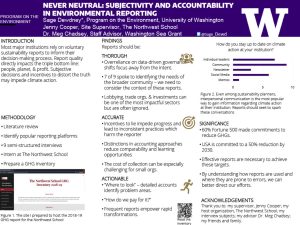Never Neutral: Subjectivity and Accountability in Environmental Reporting
Sustainability reports play an essential role in effective climate governance. As institutions move to confront the climate impacts of their operation, the systems they use to measure, manage, and understand those impacts can empower or impede the process. This study investigates popular environmental reporting mechanisms available to institutions to identify common points of tension and propose a generalized set of best practices for their application. To accomplish this, I surveyed existing literature on the topic and interviewed eight individuals involved in climate planning at various institutions about their experiences with sustainability reporting mechanisms. Findings show data-driven governance through mechanisms like greenhouse gas (GHG) inventories could convey substantial benefits, but several drawbacks may also accompany them. GHG inventories empower long-term strategic planning, goal setting, and resource management. Ideally, GHG inventories would facilitate peer comparisons and learning, but discrepancies in inventory methodology often impede comparability. Many institutions claim to possess unique circumstances that are ill-suited to generalized reporting frameworks. Beyond GHG inventories, institutions should evaluate their investments, participation in trade organizations, lobbying efforts, and community impacts. Reporting mechanisms addressing these less quantifiable mechanisms often depend on the political skills of leadership and are dependent on interactive governance systems to be considered in sustainability reports. By addressing the subjectivity and nuance inherent to sustainability reporting, we can better apply the findings of these reports, thereby improving accountability for climate impacts and empowering transformative action.
